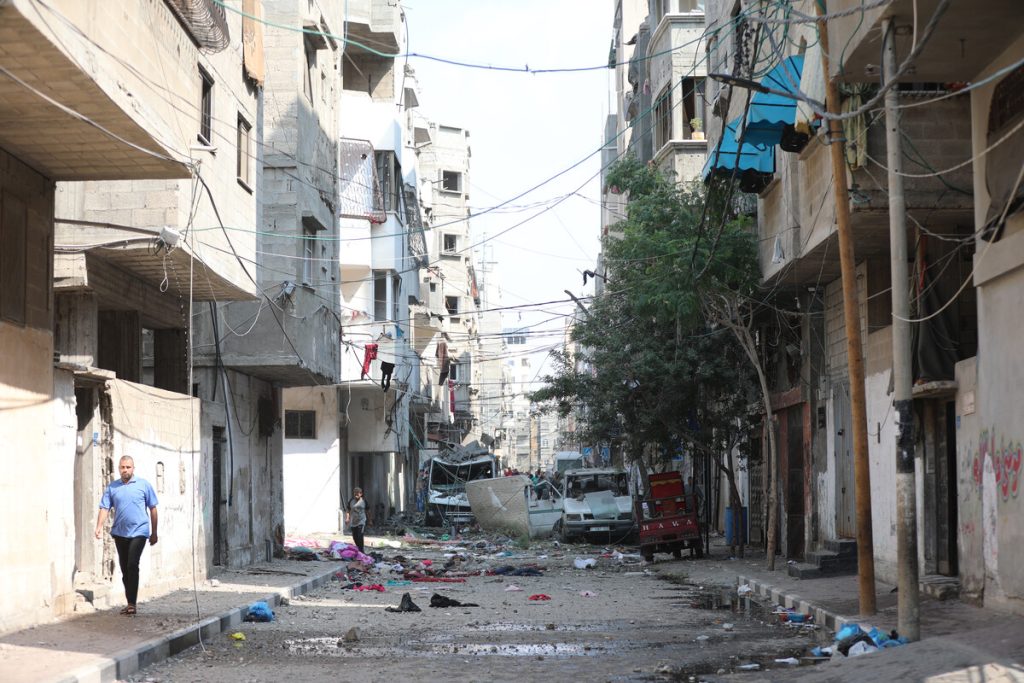Today marks the sixth day of a temporary pause in the most recent hostilities between Israel and Hamas. It is also International Day of Solidarity with the Palestinian People.
After the horrific attack on October 7, in which approximately 1,200 Israelis were killed and 200 taken hostage, the Israeli government launched a brutal siege on Gaza and its civilian population. Over 14,800 Palestinians have been killed, 70% of them women and children. At least 1.5 million have been displaced, and supplies of electricity, water, fuel, food, and medicine have been cut off. Civilian infrastructure, including homes, hospitals, and schools, lie in ruins. Thousands are injured and unable to access proper medical care, including pregnant women and new mothers.
ActionAid has been working in the occupied Palestinian territory since 2007, partnering with local women- and youth-led groups to support the most marginalized and vulnerable people. Yet, this war is unlike any other our colleagues and partners have faced.
Nowhere is safe. It is a new level of horror for a population already living in dire conditions. The humanitarian pause has allowed some essential supplies to come through, but it is not nearly enough. We desperately need a ceasefire and a process to address the root causes of this crisis. Most of the international community agrees. Unfortunately, the United States, Israel’s most powerful ally, does not. The current administration has expressed unconditional support for Israel, sending weapons and requesting additional funding to support the siege in Gaza. Rep. Rashida Tlaib, a Palestinian congresswoman, was censured by Congress for speaking her truth.
In the face of the violence we have seen, the US position is unconscionable. No civilian, Israeli or Palestinian, deserves to live in fear for their lives. The often cited ‘right to self-defense’ is not a legal blank check that frees any state/actor from its obligations under international humanitarian law. Several international experts have spoken out not only about the humanitarian crisis but also about the disproportionate response by the Israeli government that amounts to the collective punishment of the Palestinian people. The argument that the destruction of the Gaza Strip and its associated mass civilian death toll will contribute to Israel’s long-term security ignores the reality of a brutal and prolonged occupation.
For decades, the Palestinian experience has been one of dispossession and discrimination, manifested in Israel’s military occupation. Families in Gaza have been living under blockade for more than 16 years and are still recovering from previous offensives that destroyed homes, infrastructure, and livelihoods. Half the population of Gaza are children who have never known a life without the blockade or experienced a normal childhood. In the West Bank, illegal Israeli settlements continue unabated despite several UN Security Council resolutions. Apartheid policies continue to dehumanize Palestinians on a daily basis.
Despite the US administration only asking for a pause in hostilities, calls for a ceasefire are gaining momentum. Almost 50 members of Congress, including several Jewish members, are now publicly calling for a ceasefire. Over two-thirds of U.S. residents support a ceasefire, according to a recent Reuters/Ipsos poll. In a society that has become increasingly polarized, we need to find our sense of shared humanity. Palestinian self-determination and Jewish self-determination are NOT mutually exclusive. We must challenge racism in all its forms while recognizing that more than one group of people has cultural, religious, and generational ties to the region. As some experts are warning, today, Palestinian people are at risk of genocide, a tragedy that Jewish people are all too familiar with. The cycle of violence must stop. The occupation must end, and a just and durable solution, based on international law and UN resolutions, must be delivered. All actors who have violated international law need to be held accountable. We rely on our friends to tell us when we have crossed the line. The US needs to be that friend and encourage Israel, as the occupying power in this situation, to take a more humane approach.

